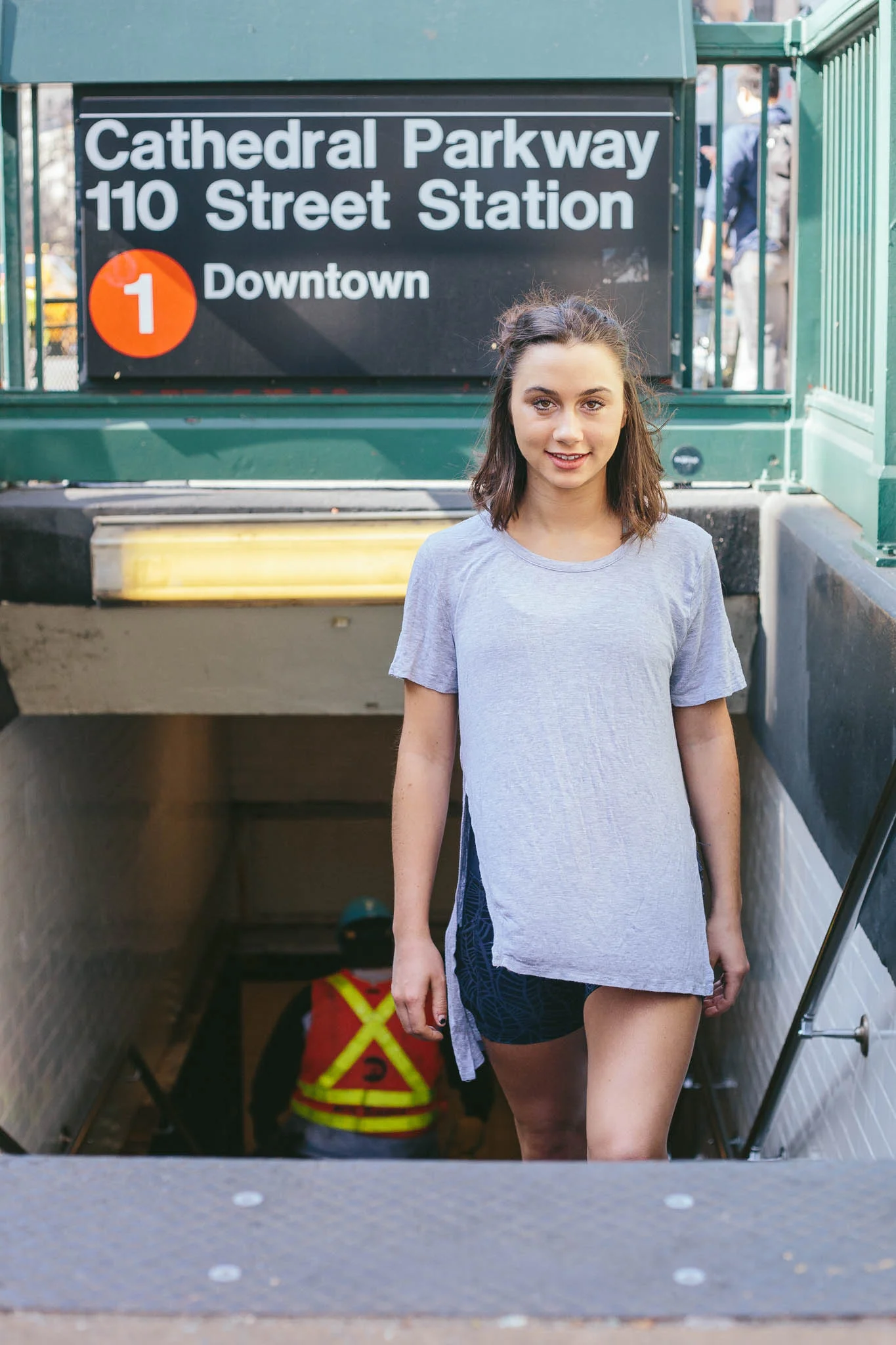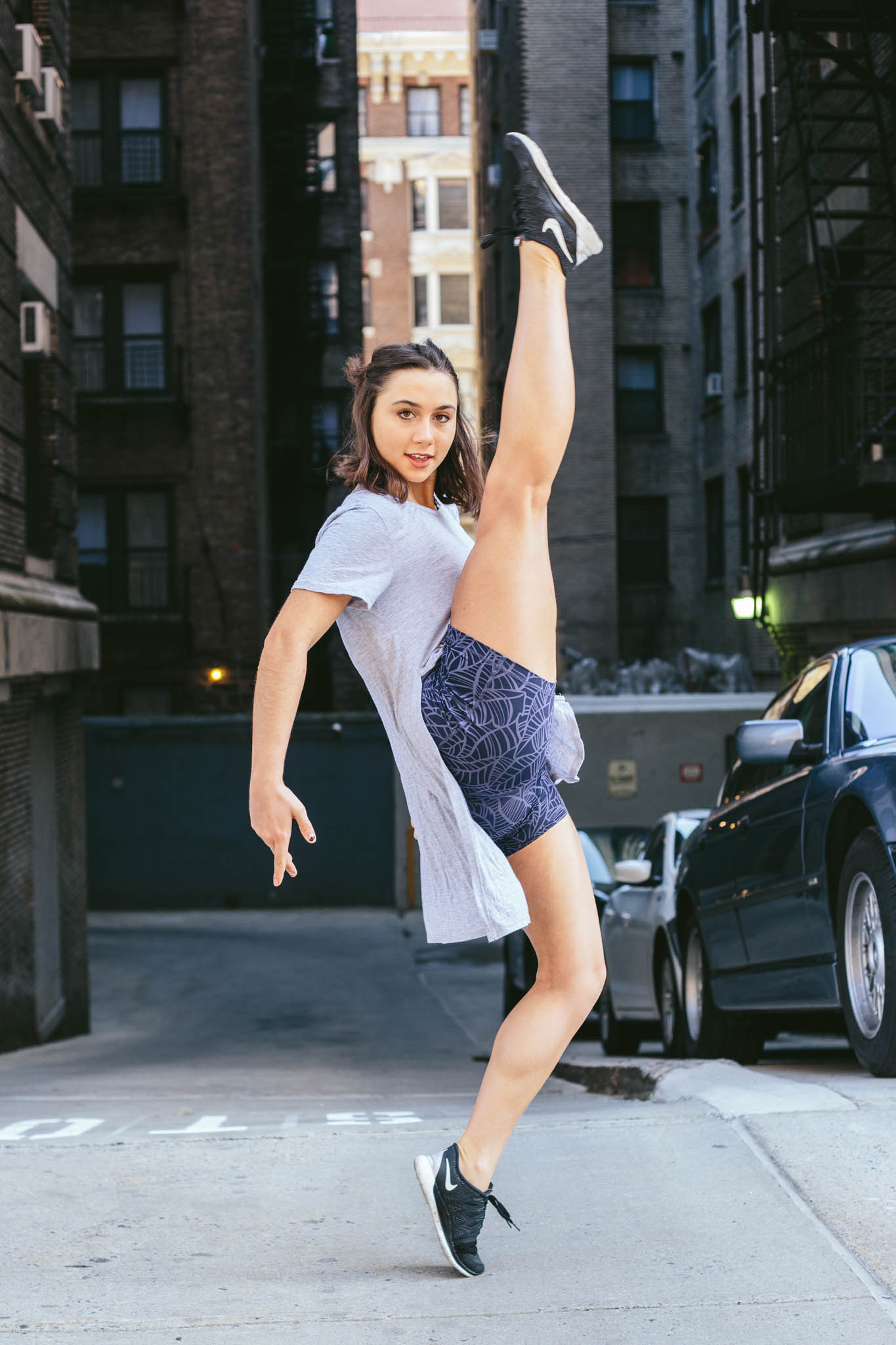Tell me a little bit about yourself.
I am a Vermonter. I was doing dance on the classically trained path for a while. But then I couldn’t do pointe anymore because they stopped offering it at my studio. So it’s been a regret of mine that I hadn’t pursued pointe and that classical ballet. But then I got really into musical theatre so I decided to go on that route. And now I am here doing musical theatre at CAP 21. Dance is definitely my forte and I love it. It’s awesome.
How long have you been dancing?
I’d like to say since I was born. Since I was about eight.
How old are you now?
I’m 18.
You graduated high school and came straight over here?
Yes.
What was a big factor in making that decision?
I love New York City and there’s a lot of dance offered here. I knew I was going to get the best training because it’s in the city. That’s what drew me the most. I have the best teachers. It’s a very short program--it’s consolidated into two years, so it’s very dense, and already I’ve learned so much from it. It was like diving right into it. That’s what I wanted to do.
Is this your first year at CAP 21?
Yeah.
Could you tell me more about the program?
It’s a musical theatre program. There are acting classes, singing classes, and dance classes. There are also voice and speech classes. They have workshops too. You’re being trained for Broadway--auditions and being a performer. It definitely comes from the acting perspective, so that’s your base. As an actor, what they say is that you’re an actor that dances and you’re an actor that sings. That’s what they build you to be and I really like that approach. It also added a lot to my dance that I didn’t know was there. It’s a musical theatre program; but still, it has improved my dancing so much because I’ve come from the acting perspective. And when you have that, it’s just more engaging and interesting to watch and to perform.
Any memorable teachers that you like from the program?
I think my most--I don’t want to say most inspiring because all my teachers are great, but I love my jazz teacher that I’ve had this past year. His name is Steven Sofia and he’s been in numerous Broadway shows as a dance captain and in the ensemble. He’s very strict and very hard on us but he’s an amazing teacher and he’s so inspiring. Really, every student in that class has been pushed to their limits but everyone has improved so much. It’s hard to be pushed to that vulnerable place but when you’re there, that’s when the best work comes. And he just really wants us to do well. And that’s why he pushes us so hard.
How many people are in your class?
In the entire class, there are 24 people. We have these four pods, so we have two, and in that group we take a lot of the same classes together and then for other classes we get mixed up but we have these core pods that we do shows in and classes in. So we get to work with much smaller group. You get lots and lots of personal attention, which is awesome.
How is the camaraderie among the students?
You have to become close with your pod of people. You’re just doing so much with each other. We’re there pretty much 12 hours a day, so you see them for the entire day. You rehearse with them-- so you become very close very fast, which is nice because everyone has each other’s back too.
What’s your typical schedule like?
On my favorite days, which are dance days, it changes throughout the year, but for this semester, we have jazz in the morning, then ballet. So 3 hours--1.5 hours of jazz and 1.5 of ballet. Then we have our lunch break. Then we have acting, and then voice and speech. And then we have a little dinner break. And then we have rehearsal for the next show that’s coming up. We’ve only done shows for the faculty as assessments, but we have our first public show that’s coming up. So we’ve been rehearsing for that during the evening and some on the weekends.
Could you tell me about the show?
Our next show coming up is going to be a revue of Rodgers and Hart. It is coming up on May. It’s the weekend of May 2nd and 3rd. We have two on Sunday and one on Saturday. It’s at CAP 21.
How was the transition from being a classically trained dancer to a musical theatre performer?
It was easy because when my studio offering a rigorous pointe program, it went in an avant-garde direction. In a way, I lost some of my ballet training but I got to explore this very avant-garde side of dance. In the studio, we have a company that people audition and get in, and we create a little show and bring that to high schools in Vermont. It’s super fun. It’s really cool to bring a very avant-garde, very new, different, modern style of performance to these high schools with all sorts of kids and audience that would normally go see this kind of thing. I’ve sorted always wanted to do musical theatre but it was just more of a clue that I should start looking back into that world.
How long have you been in the city?
A little less than a year. A lot of my family lives here so that’s nice. So I’ve been here a lot but I’ve been only living here for the year of school.
How do you like the city?
I love it. I love New York City so much.
What’s your favorite part of it?
I was asked that the other day (laughs). There’s too much. I guess I just love how it’s so alive. When you walk down the street, there are so many different characters and people and--it’s just very lively and you’re constantly surrounded by culture and energy and different kinds of people-- it’s different. And there’s everything here. Except the wildlife (laughs). Sometimes I miss that.
What’s your least favorite part?
It’s hard to think of one. Maybe walking through really packed crowds in Time Square or something like that. That’s pretty bad. And subway delays, obviously. But even that, I don’t know. All the good things definitely outweigh those kinds of things.
Where do you see yourself going from here?
I don’t want to limit my options, but I would love to be on Broadway and be---I don’t need to be a lead role because the thing is that lead roles don’t really dance too much unless you’re in a show like American in Paris or something like that where you have to dance. But I would be happy if I was in the ensemble. That’s really where I see myself as a dancer. And then maybe I might go more into the dance world-- I don’t know. I don’t know where the future will take me.
Have you been auditioning during your time here?
No. Because I definitely want to finish the program before I start. I won’t audition for anything in the fall. Because if I do get a job, I would get a job during school. so I’ll probably audition in the spring for something to do after school. I might go to auditions just to get that experience, but I haven’t auditioned for shows.
Our jazz teacher gave us a little pep talk about that the other day, because the thing is that you get rejected way more than you get accepted. As an individual, it’s really hard to be constantly rejected. You’re like, “Why am I rejected? What’s wrong with me and what do I have to change about myself?” and that’s not the case. You have to remind yourself that it’s what they want. It’s not personal. That’s what he was telling us and a part of the program is building yourself as a strong individual. A lot of our teachers are trying to support you. Some of them are really hard on us, but a lot of them are really loving and supportive. I think that’s because you can’t be broken down right before you go out into the audition world--just because you’re going to be so depressed. You have to be a strong person and really believe that you’re enough.
Is there anybody that you’d like to give a shout out to?
I would have to say my mom because she’s the best and she’s the most supportive mother. Then Steven, my jazz teacher. I’ve improved so much from his classes. He’s made me into such a better dancer. They are the two people that came to my mind right away.
Anything else that you want to share with the world?
Back to our jazz teacher again--he made us do this thing where we drew nine points and you had to connect all the points with four lines, and it’s impossible to do it if you stay inside the box. You have to go “outside of the box.” There were some of us who just drew nine points and think in their minds, “I can’t do that,” and never drew anything out. There were some people who just completely filled up their paper because they’re trying over and over again. His point was that if you don’t try, nothing will ever come of it.






